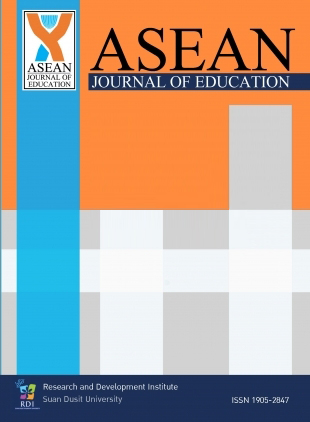Development of Learning Achievement with CIPPA Model Teaching Techniques: The Integration of Lecture and Online Teaching
Keywords:
CIPPA Model, Learning achievement, Lecture, Online teachingAbstract
This research objective is to compare the learning achievement of students enrolled in an ASEAN political course between pre-study and post-study, who studied using the CIPPA Model teaching technique. Purposive samples of 44 students in the third year and were studying in the course of Political Science and Governance in Southeast Asia. Research tools used in the study consisted of 1) a lesson plan in the Southeast Asian Politics and Governance course, and 2) an analytical learning achievement test. The results are discussed using descriptive statistics. The pre-study and post-study test scores were compared using the t-test formula and statistics to prove the hypothesis.
The research results showed that from the comparison of pre and post test scores, it was found that the t-test statistic had a Sig. (2-tailed) value of .000, which was less than the statistical significance level of .05. It could explain that when students are taught with CIPPA Model teaching techniques that combine lecture-style teaching with online teaching, retention improves. In addition, there was a statistically significant increase in the post-test score at .05. The hypothesis was accepted, that is, students who were taught with CIPPA Model teaching techniques that combined lecture-based teaching with online teaching have higher academic achievement.
References
Bindulem, T. (2019). The effect of online teaching on academic achievement of students at Diploma of the Year 1. National and International Hat Yai Academic Conference. Songkhla: Faculty Business Administration, Hat Yai University.
Buarikan, C. (2016). Learning management with the zippa teaching style on permutation for students in Mathayom 5. Chonburi: Burapha University.
Chaisri, A. (1992). Comparison of Thai language learning achievement the story of Pornvejsandorn Jatkan Kuman of 2nd year vocational certificate students learning with a group process in relation to normal teaching Phichit Technical College. (Master of Arts thesis Department of teaching Thai language graduate school Come to Kasetsart University). Kasetsart University.
Chuchuay, P. (2008). Causal Factors Influencing Academic Achievement of Undergraduate Students of Prince of Songkla University, Pattani Campus. (Master of Education Thesis Measurement and Educational Research Program Prince of Songkla University). Songkhla: Songkhla University.
Duangjit, J. (2021). Application of online teaching in conjunction with learning management with learning concepts. using the phenomenon as a base. Education Journal Burapha University, 32(3), 1-10.
Kengkanrua, P. (2017). Results of learning management by coaching method on number and group action Mathematics To develop 21st century learning skills in critical thinking and problem solving of Grade 3 students. Curriculum and teaching disciplines Thepsatri Rajabhat University.
Khamanee, T. (1999). Student-Centered Instructional Management: The CIPPA Model (CIPPA MODEL). Academic journal, Department of Academic Affairs, 2(5), 2-30.
Khamanee, T. (2013). Pedagogical science: knowledge for organizing an effective learning process. 17th edition. Bangkok: Chulalongkorn University.
Office of Higher Secondary Education Administration. (2015). Guidelines for organizing learning skills in the 21st. Century that emphasize professional competency. Bangkok: Agricultural Cooperative Community Printing House of Thailand Limited.
Panyadee, Y. (2010). The Development of Learning Achievement with Sequential Thinking Skills. Step by step writing concepts explained with flowcharts. Bangkok: Charansanitwong Commercial School.
Piromkham, W. (2003). Comparison of Learning Achievement in Thai Language Learning Subject Group on Words and Functions of Thai Words. of students in Mathayom 2 who teach with an explore teaching method and a normal teaching method. (Master’s thesis of Education). Nakhon Pathom: Silpakorn University.
Poommarin, A. (2013). The Effects of CIPPA Learning Management (CIPPA MODEL) on Sequence and Series on Problem Solving Ability and Mathematical Communication Ability of Mathayomsuksa 5 Students. (Master’s thesis of Education). Bangkok: Srinakharinwirot University. Saiyot, L. & Saiyot, A. (1995). Educational research techniques (4th edition). Bangkok: Suwiriyasorn.
Sikkhaman, K. (2011). A study of achievement in learning subject: Business English Communication Teaching By E-Learning. Sripatum University.
Srisaat, B. (2002). Preliminary research (7th edition). Bangkok: Suwiriyasan.
Taranet, C. (2017). Developing Learning Achievement in Mathematics on Probability by Teaching and learning management focuses on group processes for students in grade 5. (Master of Science Program Thesis). Chonburi: Burapha University.
Thikatti, C. (2007). Comparison of learning achievement and learning responsibility. Thai language subjects received STAD cooperative teaching (STAD) and normal teaching of students in Mathayom 3, Assumption Thonburi School. (Master's thesis in Secondary Education). Chonburi: Srinakharinwirot University.
Tiamsereewong, S. (2015). Comparison of the learning achievement of market research subjects of 2nd year vocational certificate students who study with group process teaching method in relation to normal teaching method. Bangkok: Technical Vocational College of Business Administration.
Trakunsom, P. (2009). A practical research to develop student-centred learning activities in Science, World and Change subjects by CIPPA Model, Mathayomsuksa 2, TOA Witthaya School (Tubism 1 Wat Kham Sai Thong), Muang District, Mukdahan Province. (Master of Arts Thesis Ubon Ratchathani Rajabhat University). Ubon Ratchathani: Ubon Ratchathani Rajabhat University.
Wangpanich, P. (2010). Learning Evaluation. Bangkok: Roong Ruang Printing. Webb, P. (2012). Teaching efficiency by teaching techniques based on the CIPPA Model of Thai academics for students of Public Administration, Pattaya Center. Bangkok: Rajabhat Suan Dusit University.
Webb, P. (2018). A Study of the Learning Achievement in Analytical Thinking Politics and Governance in Southeast Asia by using Syndicate teaching techniques. Bangkok: Suan Dusit University.
Downloads
Published
How to Cite
Issue
Section
License

This work is licensed under a Creative Commons Attribution-NonCommercial-NoDerivatives 4.0 International License.
1 All articles will undergo a formal peer-review. A panel of experts from within or without the university will examine the article; approval from a minimum of two experts is required for publication. Revisions posed by the experts must be completed by the research prior to publication.
2 Once published in the ASEAN Journal of Education, the article becomes intellectual property of Suan Dusit University. Duplication, in full or part, requires permission from Suan Dusit University.
3 Excluding errors incurred during printing, author(s) are responsible for the content of their articles.






